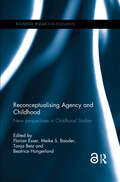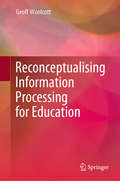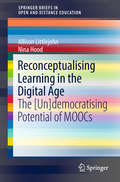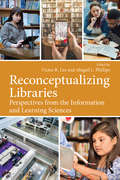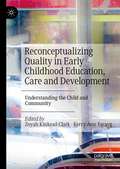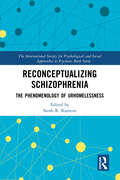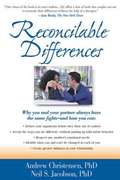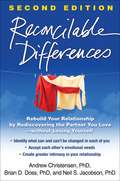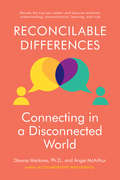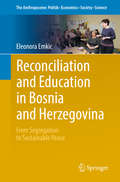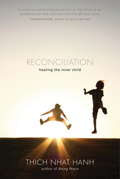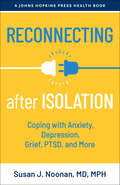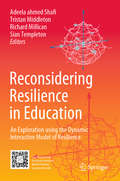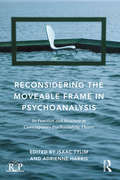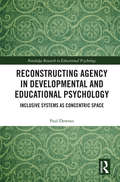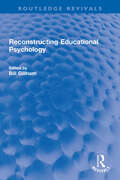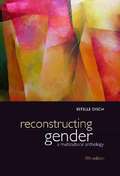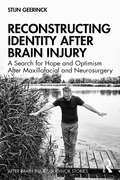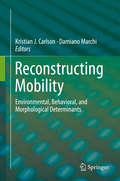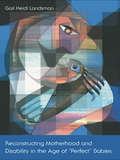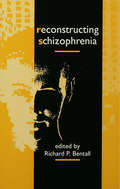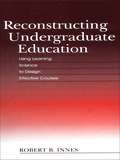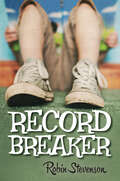- Table View
- List View
Reconceptualising Agency and Childhood: New perspectives in Childhood Studies (Routledge Research in Education)
by Beatrice Hungerland Florian Esser Meike S. Baader Tanja BetzBy regarding children as actors and conducting empirical research on children’s agency, Childhood Studies have gained significant influence on a wide range of different academic disciplines. This has made agency one of the key concepts of Childhood Studies, with articles on the subject featured in handbooks and encyclopaedias. Reconceptualising Agency and Childhood is the first collection devoted to the central concept of agency in Childhood Studies. With contributions from experts in the field, the chapters cover theoretical, practical, historical, transnational and institutional dimensions of agency, rekindling discussion and introducing fundamental and contemporary sociological perspectives to the field of research. Particular attention is paid to connecting agency in the social sciences with Childhood Studies, considering both the theoretical foundations and the practice of research into agency. Empirical case studies are also explored, which focus upon child protection, schools and childcare at a variety of institutions worldwide. This book is an essential reference for students and scholars of Childhood Studies, and is also relevant to Sociology, Social Work, Education, Early Childhood Education and Care (ECEC) and Geography.
Reconceptualising Information Processing for Education
by Geoff WoolcottThis book presents a novel conceptualisation of universal information processing systems based on studies of environmental interaction in both biological and non-biological systems. This conceptualisation is used to demonstrate how a single overarching framework can be applied to the investigation of human learning and memory by considering matter and energy pathways and their connections. In taking a stance based on everyday interactions, as well as on scientific practices, the conceptualisation is used to consider educational theories and practices, exemplified by the widely cited cognitive load theory. In linking these theories and practices more closely to scientific thinking, the book embraces an holistic approach to informational interactions, not limited to conceptualisations of pattern, signal or meaning. The book offers educational researchers and educators an opportunity to re-think their approach to instruction – to take all facets of student learning environments into account in increasing human knowledge, skills and experiences across society.
Reconceptualising Learning in the Digital Age: The [un]democratising Potential Of Moocs (SpringerBriefs in Education)
by Allison Littlejohn Nina HoodThis book situates Massive Open Online Courses and open learning within a broader educational, economic and social context. It raises questions regarding whether Massive Open Online Courses effectively address demands to open up access to education by triggering a new education order, or merely represent reactionary and unimaginative responses to those demands. It offers a fresh perspective on how we conceptualise learners and learning, teachers and teaching, accreditation and quality, and how these dimensions fit within the emerging landscape of new forms of open learning.
Reconceptualizing Libraries: Perspectives from the Information and Learning Sciences
by Victor R. Lee Abigail L. PhillipsReconceptualizing Libraries brings together cases and models developed by experts in the information and learning sciences to identify the potential for libraries to adapt and transform in the wake of new technologies for connected learning and discovery. Chapter authors explore the ways that the increased interest in the design research methods, digital media emphases, and technological infrastructure of the learning sciences can foster new collaborations and formats for education within physical library spaces. Models and case studies from a variety of library contexts demonstrate how library professionals can act as change agents and design partners and how patrons can engage with these evolving experiences. This is a timely and innovative volume for understanding how physical libraries can incorporate and thrive as educational resources using new developments in technology and in the learning sciences.
Reconceptualizing Quality in Early Childhood Education, Care and Development: Understanding the Child and Community
by Zoyah Kinkead-Clark Kerry-Ann EscaygRecognizing the various ecological contexts that support children’s development while amplifying voices from across the globe, this book challenges narrow interpretations of quality and best practice. Each author offers a unique perspective on issues germane to the field of early childhood education: perceptions of children, curriculum, teacher education, and play-based learning. An innovative, timely, and much-needed contribution, this book represents an inclusive collection of theoretical and cultural knowledge, as well as research. Such a diverse multicentric lens opens new intellectual pathways for authentic, reciprocal knowledge exchange, while ensuring that a reimagining of early childhood education remains at the core of our teaching practice, scholarship, and activism. This book invites everyone to imagine, to dare to believe, to hope, and to act—in the interests of children, in the interests of communities and families, and in the moral precepts of equity, inclusion and justice.
Reconceptualizing Schizophrenia: The Phenomenology of Urhomelessness (The International Society for Psychological and Social Approaches to Psychosis Book Series)
by Sarah R. KamensThis volume presents a novel, international research study that reconceptualizes schizophrenia through an investigation of ways in which the first-hand experiences of those with a diagnosis differ from conventional diagnostic definitions. Offering insight into the history of psychiatric taxonomies in general and the invention of the schizophrenia diagnosis in particular, Reconceptualizing Schizophrenia maps the emergence of uncertainties about the empirical and conceptual status of contemporary diagnostic systems. Particular focus is given to the heterogeneity problem, or the problem of wide empirical variation within and between disorder categories. At the heart of this book are interviews with mental health service users with psychotic-disorder diagnoses in New York City and Jerusalem. Through a detailed portrait of their existential and socio-institutional worlds, the book unveils a way of being-in-the-world characterized by the experience of feeling profoundly vulnerable and unsafe in an inhospitable world as well as foreclosed from belonging to one or more human communities. As this psychological portrait of urhomelessness unfolds, the reader becomes slowly aware of the relationships between psychotic experiences – often thought to be bizarre or ‘un-understandable’ – and the timeless ways in which all humans seek to dwell in the world. Making an important contribution to the phenomenological-existential literature on psychosis, and demonstrating interdisciplinary and transcultural approaches to understanding anomalous experiences, this volume will be of great interest to researchers and scholars of transcultural psychiatry, clinical psychology, and critical theory.
Reconcilable Differences
by Neil Jacobson Andrew ChristensenEvery couple has arguments, but what happens when recurring battles begin to feel like full-scale war? Do you retreat in hurt and angry silence, hoping that a spouse who "just doesn't get it" will eventually see things your way? Spend the time between skirmishes gathering evidence that you're right? Demand some immediate changes--or else? Whether due to innate personality traits or emotional vulnerabilities, there are some aspects of our behavior that are difficult to alter. But these differences do not have to get in the way of healthy, happy, and long-lasting romance. This practical guide offers new solutions for couples frustrated by continual attempts to make each other change. Aided by thought-provoking exercises and lots of real-life examples, readers will learn why they keep having the same fights again and again; how to keep small incompatibilities from causing big problems; and how true acceptance can restore health to their relationships.
Reconcilable Differences, Second Edition
by Andrew Christensen Neil S. Jacobson Brian D. DossEvery couple has disagreements, but what happens when recurring conflicts start to pull your relationship apart? Do you lie awake hoping that your spouse will eventually see things your way, or rehashing the evidence that you're right? Demand some immediate changes--or else? This popular, science-based guide offers powerful solutions for couples frustrated by continual attempts to make each other change. True acceptance may seem difficult to accomplish, but the clear-cut steps and thought-provoking exercises in this book can make it a reality. You'll learn why you keep having the same fights again and again; how to keep small incompatibilities from causing big problems; what communication strategies really work to resolve conflicts; and how to problem-solve and make positive changes--together. Updated throughout with new research, practical tools, and examples, the second edition features a new chapter on mindfulness. Mental health professionals: learn about using this self-help guide as an adjunct to therapy at the authors' website (http://ibct.psych.ucla.edu).
Reconcilable Differences, Second Edition
by Andrew Christensen Neil S. Jacobson Brian D. DossEvery couple has disagreements, but what happens when recurring conflicts start to pull your relationship apart? Do you lie awake hoping that your spouse will eventually see things your way, or rehashing the evidence that you're right? Demand some immediate changes--or else? This popular, science-based guide offers powerful solutions for couples frustrated by continual attempts to make each other change. True acceptance may seem difficult to accomplish, but the clear-cut steps and thought-provoking exercises in this book can make it a reality. You'll learn why you keep having the same fights again and again; how to keep small incompatibilities from causing big problems; what communication strategies really work to resolve conflicts; and how to problem-solve and make positive changes--together. Updated throughout with new research, practical tools, and examples, the second edition features a new chapter on mindfulness. Mental health professionals: learn about using this self-help guide as an adjunct to therapy at the authors' website (http://ibct.psych.ucla.edu).
Reconcilable Differences: Connecting in a Disconnected World
by Dawna Markova Angie McarthurA remarkable new way to move beyond biases and blind spots (especially if you don’t think you have any!) so you can communicate more effectively with a friend, lover, relative, or colleague You know what it feels like to be “at odds” with someone. Sometimes it seems like you are speaking completely different languages. Cognitive neuroscientist Dr. Dawna Markova and communication expert Angie McArthur have spent years developing and implementing tools to help people find common ground. In Reconcilable Differences, they provide the strategies you need to bridge the gap at the heart of your differences with others. Each of us possesses rational intelligence: the capacity to divide information into discrete categories, processes, and logical steps. But you may not realize that the secret to building bridges between people lies hidden in your relational intelligence: the way you communicate, understand, learn, and trust. Reconcilable Differences shows you how to map mind patterns (the secret to pinpointing communication pitfalls) and identify thinking talents (the catalysts for peak performance). You will gain insights into how you learn in order to turn doubt into trust and uncertainty into productive engagement. Brimming with anecdotes and advice not only from the authors’ files but also from their own experiences as a mother- and daughter-in-law who are like night and day, Reconcilable Differences is your guidebook for making profoundly positive change with those you care about.Advance praise for Reconcilable Differences “Reconcilable Differences offers an inspiring way to bridge differences with someone you care about. It will help you identify and improve your relational intelligence, and become a better communicator in the process.”—Deepak Chopra, co-author of You Are the Universe: Discovering Your Cosmic Self and Why It Matters “Dawna Markova and Angie McArthur offer an extremely insightful road map to navigating the diverse ways each of us approaches making ourselves understood, as well as the way we tend to hear others. The insights and strategies herein are simple and elegant. The advice is as invaluable for success at work as it is for success in life.”—Peter Sims, founder and CEO, Parliament, Inc., and author of Little Bets: How Breakthrough Ideas Emerge from Small Discoveries “True communication begins with understanding yourself and the way you are being understood. This book is a powerful guide to self-analysis and bridge-building.”—Suzy Amis Cameron, co-founder, the MUSE School
Reconciliation and Education in Bosnia and Herzegovina
by Eleonora EmkicTwo decades after the war, Bosnia and Herzegovina (BiH) still faces a weak national identity and ethnic and religious divisions that are further preventing the country from reaching sustainable peace and development. The education system is also divided along ethnic and religious lines. This study discusses research questions about challenges BiH has been facing on its way to peace transformation; about relation between the current educational system and development of sustainable peace in BiH; as well as to answer how to achieve positive and sustainable peace in BiH through peace education. In order to offer a peacebuilding framework the study offers an analysis of the role of education and educational programmes (formal and non-formal) in the creation of ethnic identity and peaceful coexistence in BiH since the Ottoman Empire until today. The study relies on interviews with stakeholders from BiH about gaps in the peacebuilding process, education system and suggestions for improvement.
Reconciliation: Healing the Inner Child
by Thich Nhat HanhBased on Dharma talks by Zen Master Thich Nhat Hanh and insights from participants in retreats for healing the inner child, this book is an exciting contribution to the growing trend of using Buddhist practices to encourage mental health and wellness. Reconciliation focuses on the theme of mindful awareness of our emotions and healing our relationships, as well as meditations and exercises to acknowledge and transform the hurt that many of us experienced as children. The book shows how anger, sadness, and fear can become joy and tranquility by learning to breathe with, explore, meditate, and speak about our strong emotions. Reconciliation offers specific practices designed to bring healing and release for people suffering from childhood trauma. The book is written for a wide audience and accessible to people of all backgrounds and spiritual traditions.
Reconnecting after Isolation: Coping with Anxiety, Depression, Grief, PTSD, and More (A Johns Hopkins Press Health Book)
by Susan J. NoonanHow to keep calm, carry on, and reconnect during times of social isolation and emotional crisis.Although spending time alone for short periods may be restorative and helpful, unintentional or involuntary isolation can have profound detrimental effects on emotional and physical health. We all need social interaction and meaningful relationships in our lives to be well and thrive. Without them, we flounder. In Reconnecting after Isolation, Dr. Susan J. Noonan draws on our collective experience of the COVID-19 pandemic to help readers deal with the emotional impact of social isolation. Speaking as both a provider and recipient of mental health care services, Noonan combines her professional and personal experiences in an evidence-based and practical guide. Drawing on meticulous research and interviews with four psychologists, she outlines steps to overcome the emotional trauma of isolation.The book touches on how social isolation, loneliness, and stress affect each of us individually and can sometimes provoke depression, anxiety, post-traumatic stress disorder, suicidality, and substance use. Describing specific lifestyle interventions that may help, it offers tips for• developing effective coping skills• facing isolation-induced fears adapting effectively to the changes in our personal, family, work, academic, and social lives caused by imposed isolation• finding effective, culturally sensitive mental health care• improving sleep hygiene• building and maintaining resilience • adopting a healthy diet• overcoming the fatigue burnout • grieving a loss• engaging in regular physical exercise• keeping a daily routine or structure• maintaining contact with othersDr. Noonan also discusses re-entry anxiety, the challenging experience many have upon returning to their prior lifestyle, and the difficulty of establishing new school and work routines following social isolation. Accessible and compassionate, Reconnecting after Isolation empowers individuals to manage their own challenges, offering them a better chance of recovery and of staying well.
Reconsidering Resilience in Education: An Exploration using the Dynamic Interactive Model of Resilience
by Sian Templeton Tristan Middleton Adeela Ahmed Shafi Richard MillicanThis book explores the concept of resilience and its significance in responding to a rapid and ever-changing globalised world whilst critiquing its ‘buzzword’ status in contemporary times. Drawing on research from a range of educational settings, the book demonstrates that the resilience of individuals and their surrounding systems should not be viewed in isolation and that the interplay between individual resilience, community resilience and resilient societies is complex and symbiotic. On this basis, it illustrates that efforts to promote resilience would benefit from a systems approach capable of coping with this complexity.Using the ideas of agency and the power of self-determinism, a development of Bronfenbrenner's bio-ecological model is presented to illustrate the complexity of their interplay. Existing models of resilience are developed with the book offering the Dynamic Interactive Model of Resilience (DIMoR) as a way to analyse and support resilience which moves beyond a reductionist, descriptive and ‘fashionable’ presentation of resilience.
Reconsidering the Moveable Frame in Psychoanalysis: Its Function and Structure in Contemporary Psychoanalytic Theory (Relational Perspectives Book Series)
by Isaac Tylim Adrienne HarrisReconsidering the Moveable Frame in Psychoanalysis explores the idea of ‘the frame’ at a time when this concept is undergoing both systematic revival and widespread transformation. It has always been tempting to see the frame as a relatively static, finite and definable feature of psychoanalytic work. At its most basic, the frame establishes agreed upon conditions of undertaking psychoanalytic work. But as this book shows, the frame has taken on a protean quality. It is sometimes a source of stability and sometimes a site of ethical regulation or discipline. It can be a place of imaginative mobility, and in certain analytic hands, a device for psychic work on projections and disavowals. Beginning with a seminal essay on the frame by José Bleger, this book includes commentary on that work and proceeds to explorations of the frame across different psychoanalytic theories. The frame is perhaps one of the spots in psychoanalysis where psyche and world come into contact, a place where the psychoanalytic project is both protected and challenged. Inevitably, extra-transferential forces intrude onto the psychoanalytic frame, rendering it flexible and fluid. Psychoanalysts and analysands, supervisors and candidates are relying increasingly on virtual communication, a development that has effected significant revisions of the classical psychoanalytic frame. This book presents a dialogue among distinct and different voices. It re-examines the state and status of the frame, searching for its limits and sifting through its unexpected contents whilst expanding upon the meaning, purview and state of the frame. Reconsidering the Moveable Frame in Psychoanalysis will appeal to all psychoanalysts and psychoanalytic psychotherapists interested in how best to understand the frame and to use it most effectively in their clinical practice.
Reconstructing Agency in Developmental and Educational Psychology: Inclusive Systems as Concentric Space (Routledge Research in Educational Psychology)
by Paul DownesThis book reconstructs the foundations of developmental and educational psychology and fills an important gap in the field by arguing for a specific spatial turn so that human growth, experience and development focus not only on time but space. This regards space not simply as place. Highlighting concrete cross-cultural relational spaces of concentric and diametric spatial systems, the book argues that transition between these systems offers a new paradigm for understanding agency and inclusion in developmental and educational psychology, and for relating experiential dimensions to causal explanations. The chapters examine key themes for developing concentric spatial systemic responses in education, including school climate, bullying, violence, early school leaving prevention and students’ voices. Moreover, the book proposes an innovative framework of agency as movement between concentric and diametric spatial relations for a reconstruction of resilience. This model addresses the vital neglected issue of resistance to sheer cultural conditioning and goes beyond the foundational ideas of Bronfenbrenner’s ecological systems theory, as well as Vygotsky, Skinner, Freud, Massey, Bruner, Gestalt and postmodern psychology to reinterpret them in dynamic spatial systemic terms. Written by an internationally renowned expert, this book is a valuable resource for academics, researchers and postgraduate students in the areas of educational and developmental psychology, as well as related areas such as personality theory, health psychology, social work, teacher education and anthropology.
Reconstructing Educational Psychology (Routledge Revivals)
by Bill GillhamFirst published in 1978, Reconstructing Educational Psychology presents a new look at topics of central social concern such as children’s rights, the community approach to children’s problems, the inutility of traditional concepts of intelligence and personality, the interactionist approach to the concept of ‘deviant’ behaviour and the invalidity of psychiatric concepts of ‘maladjustment’. New ideas are the core of the book. It begins with historical and personal accounts of the origin and the nature of the situation of educational psychology. It spells out the way in which new thinking determines new practice, and the extent to which progress has been made. The book will be of interest to teachers, psychologists as well as to students of pedagogy and psychology.
Reconstructing Gender: A Multicultural Anthology
by Estelle DischReconstructing Gender is an anthology that addresses the contemporary experiences from a variety of women and men. Drawing from a wide range of sources including research articles, critical essays, and personal narratives, Disch has chosen accessible, engaging, and provocative readings that represent many perspectives and experiences. Eleven part-opening introductions identify important issues in the general field of study, describe the readings, remind the reader about some of the central themes emerging throughout the book, and raise questions for students to consider.
Reconstructing Identity After Brain Injury: A Search for Hope and Optimism After Maxillofacial and Neurosurgery (After Brain Injury: Survivor Stories)
by Stijn GeerinckReconstructing Identity After Brain Injury tells the remarkable story of Stijn Geerinck and his journey from road traffic accident to recovery. After he was hit by a drunk driver whilst cycling, Stijn suffered a traumatic brain injury and had to undergo drastic maxillofacial and neurosurgery. In his own words, this book narrates Stijn’s difficult recovery, focusing on the physical, medical, mental, social and financial changes he had to endure. It lays the groundwork for coping with permanent impairment resulting from TBI, including lifelong lesions and the irreversible physical changes. The testimonial narrative is complemented with philosophical insights, providing key philosopher’s reflections on the experience of brain injury. Stijn also explores the essential human characteristics of resilience, fighting spirit, emotionality, despair, vulnerability, hope, depression, optimism, anxiety, rationality, focus, anger and love, as he looks at the impact of his brain injury and resulting disfigurement on his masculine identity. It is essential reading for any professional involved in neuropsychological rehabilitation, and all those touched by this condition.
Reconstructing Mobility
by Kristian J. Carlson Damiano MarchiAssembles a collection of experts to provide a current account of different approaches (e. g. , traditional, comparative and experimental) being applied to study mobility. Moreover, the book aims to stimulate new theoretical perspectives that adopt a holistic view of the interaction among intrinsic (i. e. skeletal) and extrinsic (i. e. environmental) factors that influence differential expression of mobility. Since the environment undoubtedly impacts mobility of a wide variety of animals, insights into human mobility, as a concept, can be improved by extending approaches to investigating comparable environmental influences on mobility in animals in general. The book teases apart environmental effects that transcend typical categories (e. g. , coastal versus inland, mountainous versus level, arboreal versus terrestrial). Such an approach, when coupled with a new emphasis on mobility as types of activities rather than activity levels, offers a fresh, insightful perspective on mobility and how it might affect the musculoskeletal system.
Reconstructing Motherhood and Disability in the Age of Perfect Babies
by Gail LandsmanExamining mothers of newly diagnosed disabled children within the context of new reproductive technologies and the discourse of choice, this book uses anthropology and disability studies to revise the concept of "normal" and to establish a social environment in which the expression of full lives will prevail.
Reconstructing Schizophrenia
by Richard P. Bentall`The summaries of evidence have provided ready-made challenges to previously unquestioned medical options ... the book provides a challenging update on the nature of scientific inquiry.' - British Journal of Clinical PsychologyDespite nearly one hundred years of research, very little progress has been achieved in the understanding of schizophrenic behaviour. There remains considerable uncertainty even about the fundamental features of the hypothesised illness.Reconstructing Schizophrenia subjects the difficult concept of schizophrenia to rigorous scientific, historical and sociological scrutiny. They ask why a biological defect has been assumed in the absence of hard evidence and look at what can be done psychologically to alleviate schizophrenic symptoms. Finally, they explore what new models and research strategies are required in order to understand schizophrenic behaviour. The result is a book that provides a distinctive and critical perspective on modern psychiatric theories and which demonstrates the severe limitations of an exclusively medical approach to understanding madness.
Reconstructing Undergraduate Education: Using Learning Science To Design Effective Courses
by Robert B. InnesThis book is designed to introduce professors and administrators in higher education to the philosophical, theoretical, and research support for using a constructivist perspective on learning to guide the reconstruction of undergraduate education. It presents an original framework for systematically linking educational philosophy and learning theories to their implications for teaching practice. In this volume, Innes summarizes the sources he found most useful in developing his own set of teaching principles and course development process, and makes an argument for a particular perspective on learning--transactional constructivism--which is consistent with the philosophy of John Dewey and supported by current theory and research in learning science. Transactional constructivism, a combined approach, builds on the strengths of two competing views: psychological constructivism and the sociocultural perspective. Reconstructing Undergraduate Education: Using Learning Science to Design Effective Courses: *overviews the philosophical and theoretical underpinnings of the teaching model that is the focus of the volume; *presents a summary of Dewey's educational philosophy and connects his work to current theory and research in learning science; *examines psychological constructivism, one of the basic positions within the range of learning theories that takes a constructivist perspective; *offers a case study example of a course designed and taught from this perspective; *reviews the sociocultural and the transactional constructivist perspectives; *explores the quality of dialogue and disciplinary discourse in the classroom--an issue that is critical to the success of models derived from a transactional constructivist perspective on learning; and *explores broader issues related to reform in higher education. This volume is a vital resource for all professionals involved in undergraduate education.
Reconstruction of Wave-Particle Duality and its Implications for General Chemistry Textbooks
by Mansoor Niaz Cecilia MarcanoIt goes without saying that atomic structure, including its dual wave-particle nature, cannot be demonstrated in the classroom. Thus, for most science teachers, especially those in physics and chemistry, the textbook is their key resource and their students' core source of information. Science education historiography recognizes the role played by the history and philosophy of science in developing the content of our textbooks, and with this in mind, the authors analyze more than 120 general chemistry textbooks published in the USA, based on criteria derived from a historical reconstruction of wave-particle duality. They come to some revealing conclusions, including the fact that very few textbooks discussed issues such as the suggestion, by both Einstein and de Broglie, and before conclusive experimental evidence was available, that wave-particle duality existed. Other large-scale omissions included de Broglie's prescription for observing this duality, and the importance of the Davisson-Germer experiments, as well as the struggle to interpret the experimental data they were collecting. Also untouched was the background to the role played by Schrödinger in developing de Broglie's ideas. The authors argue that rectifying these deficiencies will arouse students' curiosity by giving them the opportunity to engage creatively with the content of science curricula. They also assert that it isn't just the experimental data in science that matters, but the theoretical insights and unwonted inspirations, too. In addition, the controversies and discrepancies in the theoretical and experimental record are key drivers in understanding the development of science as we know it today.
Record Breaker
by Robin StevensonIt's 1963, and Jack's family is still reeling from the SIDS death of his baby sister. Adrift in his own life, Jack is convinced that setting a world record will bring his father back to his senses and his mother back to life. But world events, including President Kennedy's assassination, threaten to overshadow any record Jack tries to beat—from sausage eating to face slapping. Nothing works, and Jack is about to give up when a new friend suggests a different approach that involves listening to, not breaking, records.
